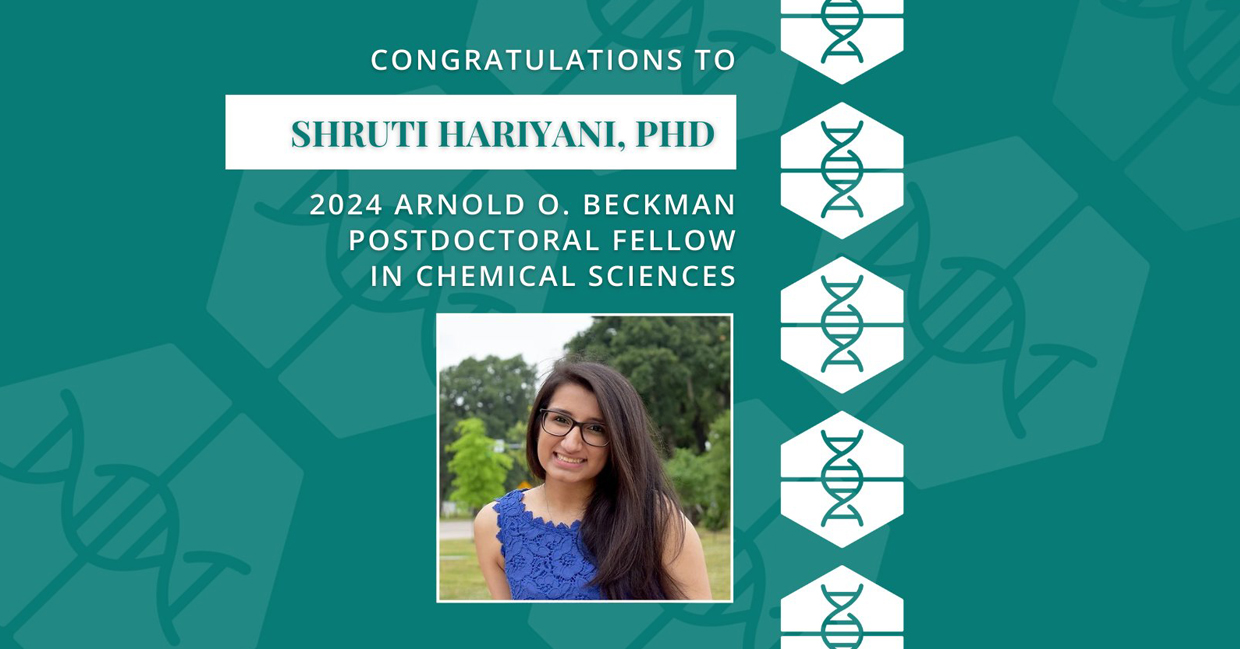
Dr. Shruti Hariyani, a postdoctoral researcher in the Department of Chemistry at Texas A&M University, has been selected as a 2024 Arnold O. Beckman Postdoctoral Fellow.
Hariyani is one of 14 researchers across the nation announced last week as recipients of the coveted honor, considered one of the most prestigious and highly competitive fellowships awarded to postdoctoral researchers studying chemical sciences and instrumentation. A Houston native, she is the first Beckman Postdoctoral Fellow in Texas A&M history, joining a total of 146 others chosen since the fellowship program’s inception in 2015.
"The individuals selected as fellows for this program are doing research that is important and innovative, and will help introduce new methods, processes and instrumentation to the scientific community," said Dr. Anne Hultgren, executive director of the Arnold and Mabel Beckman Foundation. "We look forward to providing these exceptional young scientists with support as they transition to independent, impactful research careers."
The Beckman Postdoctoral Fellowship program is named for Arnold O. Beckman, a revolutionary in the invention and development of chemical instrumentation and founder of Beckman Instruments Inc. Beckman Postdoctoral Fellows are chosen to underscore the California-based Arnold and Mabel Beckman Foundation’s mission of supporting basic research in the chemical sciences and chemical instrumentation.
Hariyani and her fellow members of the 2024 class were selected from among hundreds of applicants following a three-part review led by a panel of scientific experts, based on their research proposals and potential for success in an independent academic career in the chemical sciences. Each will receive $224,000 over two years in salary and research support intended to assist them as they transition from mentored yet independent researchers to tenure-track positions.

Since fall 2023, Hariyani has been a member of Texas A&M chemist and Davidson Chair in Science Dr. Sarbajit Banerjee’s research group, where her work focuses on solid-state materials for use in developing fluoride-ion batteries and neuromorphic computing. Both areas capitalize on the tunability of materials that exhibit unusual chemical bonding properties and/or electronic instabilities with the goal of providing rechargeable power devices with increased efficiency that are more environmentally friendly along with machine computation capable of mimicking brain-like intelligence and neuronal circuitry, courtesy of more energy-efficient processors with increased throughput and speed.
Prior to coming to Texas A&M, Hariyani amassed a stellar undergraduate and graduate career at the University of Houston, where she earned both a bachelor of science in chemistry (May 2018) and a Ph.D. in inorganic chemistry (May 2023). Her graduate research within the College of Natural Sciences and Mathematics under the mentorship of Associate Professor Chemistry Dr. Jakoah Brgoch focused on functional inorganic materials — specifically, producing energy-efficient LED-based white lighting and displays through the synthesis and characterization of luminescent phosphor materials. Hariyani's goal was to develop “human-centric” lighting aimed at reducing exposure to blue light that can dramatically impact circadian rhythms and human health.
In the course of her graduate research, Hariyani discovered many new compounds, including those that absorb in the violet portion of the visible spectrum instead of the blue and some that are more highly performing than those currently on the market. In May, she was recognized with the college’s 2023 Dan E. Wells Outstanding Dissertation Award honoring her work toward the design and discovery of new luminescent phosphors used in LED bulbs and touchscreen displays. Hariyani’s other honors to date include the American Chemical Society (ACS) Division of Inorganic Chemistry Young Investigator Award and a Chemistry of Materials Lectureship and Best Paper Award.
“In the few months Shruti has been with us at Texas A&M University, she has blown us away with her tremendous creativity in synthetic solid state chemistry, the incredible rigor and ambition of her measurements and her keen intuition for functional applications," Banerjee said. "Shruti had an incredible trailblazing doctoral dissertation and has had a similarly outstanding start to her postdoctoral research. The combination of synthetic ingenuity, modeling prowess and experimental skills that she brings to the table is truly distinctive.”
As a Beckman Postdoctoral Fellow, Hariyani will continue to explore novel approaches to designing fluorine-ion batteries. She plans to utilize a hybrid computational and experimental approach to discover new electrode materials capable of shuffling fluoride ions, rather than lithium ions currently being used to power most batteries today. While fluoride ion batteries are still in their nascent stage, her research will help identify the crystal chemical features that control and influence the diffusion of fluoride ions. The development of this technology has the potential to lessen society’s dependence upon lithium, which Hariyana notes is facing issues of materials criticality.
Founded in 1977, the Arnold and Mabel Beckman Foundation supports US institutions and young scientists whose creative, high-risk and interdisciplinary research will lead to innovations and new tools and methods for scientific discovery.
Learn more about the Beckman Postdoctoral Fellows Program or current research projects underway within the Banerjee Group.
Find additional information about graduate research in the College of Arts and Sciences or postdoctoral research opportunities at Texas A&M University.

